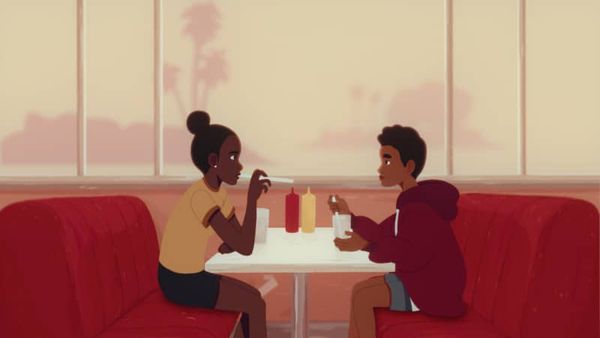Eye For Film >> Movies >> It's Nice In Here (2022) Film Review
It's Nice In Here
Reviewed by: Amber Wilkinson

Fragmented memories come together to present the multifaceted tragedy of a single deadly act in Robert-Jonathan Koeyers Oscar short-listed 16-minute animation.
He takes us on a ride through the stream of consciousness recollections of black 12-year-old Imani (Anka Ferris) as she recalls her 11-year-old friend Crimson's life and his untimely death. Koeyers takes us into Imani's mindscape where we see her interactions with Crimson - a nickname he acquired from his favourite 'C' emblazoned hoodie - intercut with shots of her staring at a camera, complete with static fizz that indicates this is a police recording. Small things take on significance - a nosebleed, auguring worse to come, a bike's handlebar, a bell.

A shop bell tinkles gently in another recollection, too, which paints a very different picture of events. David (Henry Brinkerhoff) is a rookie cop and a new dad, whose look screams of stress. He remembers Crimson too, but not with the same warmth as Imani. We see a previous encounter in which David rifled through Crimson's sketch book, it's a brief collage of memories and thoughts, although if you are a quick reader, you might spot the repeated observation: "Half of the day is night."
It's night that brings trouble for Crimson of the sort all too familiar from US newsreels, as David's fears meet those of Crimson in a disastrous way. Koeyers lets ideas flow over one another, like raindrops joining each other as they roll down glass. Happy memories flow into a moment of terror, whispers of gun anxiety overlap those of a parent's advice to a black child on how to stay safe during police interactions.
While the act is horrific and unjust Koeyers shows how the aftermath is as bad, if not worse. We see Crimson in an altogether brighter space as his life is picked over by a wildly speculating media, heavy with insinuation, light on fact. The power of suggestion is a constant background element. In Imani's case she imagines 'staying on track' as a rollercoaster, while David's brain suggests things to him that prove fatal to Crimson. In the end, though, Koyers pointedly asks what the power of media suggestion might be leading us to think irrespective of the truth. After all, when it comes to telling his side of the story, for Crimson, the bell has sounded and it's too late.
Reviewed on: 29 Dec 2022















